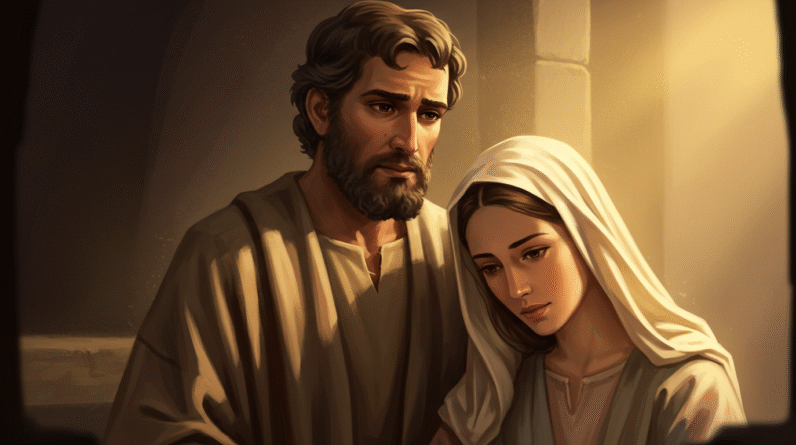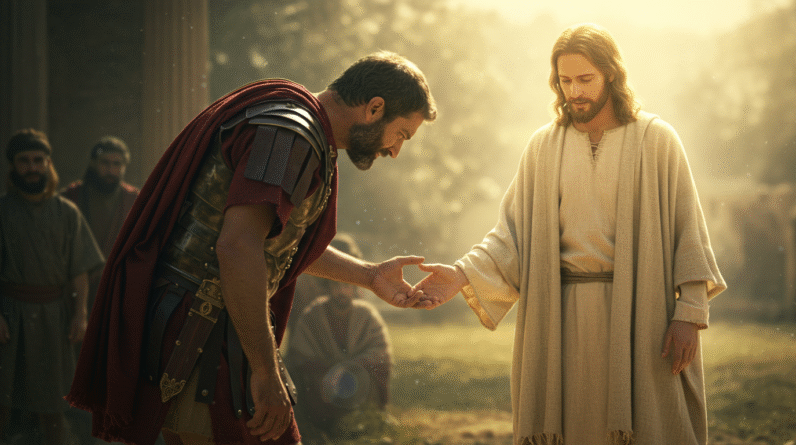Stephen’s Last Words: Radical Forgiveness In The Face Of Death
In the annals of human courage and resilience, few stories stand as stark and compelling as that of Stephen, the first Christian martyr. If you’ve ever wondered how far forgiveness can reach, Stephen’s narrative offers an extraordinary insight. Through the defining moment of his life—and death—he exemplified a form of forgiveness that was almost otherworldly, a radical forgiveness in the face of death.
Who Was Stephen?
Before delving into Stephen’s final moments, you might be curious about who he was. Stephen was one of the leaders of the early church, a man deeply committed to his faith and recognized for his wisdom and spiritual insight. The Book of Acts describes him as “a man full of faith and the Holy Spirit” Acts 6:5. Beyond his spiritual prowess, Stephen was chosen to serve as a deacon, effectively helping to distribute food and care for the poor, ensuring no one was overlooked in the fledgling Christian community.
The Context of Stephen’s Martyrdom
It’s essential to understand the backdrop against which Stephen’s story unfolds. In a time when proclaiming faith in Jesus Christ could be a perilous endeavor, Stephen held firm to his beliefs. His teachings and miraculous works drew attention, both favorable and hostile. Accusations soon followed, leading to his trial before the Sanhedrin, the highest Jewish court.
Stephen addressed the Sanhedrin with a powerful speech, masterfully retelling the history of Israel and emphasizing how their ancestors had resisted God’s messengers time and again. This was a bold assertion, inferring that the council members were resisting God by rejecting Jesus. Not surprisingly, his words incited outrage.
Stephen’s Last Words
In what would be his final moments, Stephen experienced a divine vision. He exclaimed, “Look, I see heaven open and the Son of Man standing at the right hand of God” Acts 7:56. This vision was an affirmation of his unwavering faith. But what stands out, even more, is his response to those who were about to end his life.
As stones began to rain down upon him—a brutally unjust and painful demise—he lifted his voice not to curse or cry, but to pray for his attackers. His words were a poignant echo of Jesus’ plea on the cross: “Lord, do not hold this sin against them” Acts 7:60. These final words of Stephen were not just a testament to his character but also to the transformative power of faith and, particularly, forgiveness.
The Radical Nature of Stephen’s Forgiveness
By any measure, Stephen’s ability to forgive was radical. When most would succumb to fear or hatred, Stephen looked upon his aggressors with compassion. It’s startling to think about it—how forgiveness can take root in moments of such acute suffering and injustice. Stephen’s forgiveness wasn’t passive acceptance; it was a deliberate love, a conscious choice anchored in his profound spiritual belief.
Not only does this act of Stephen’s forgiveness speak to his incredible character, but it also serves as a deeply resonant example for us. It challenges us to reconsider our capacity for forgiveness, especially when faced with situations far less dire than Stephen’s.

Why Stephen’s Forgiveness Matters Today
You might ask, Why does an act of forgiveness from over two millennia ago hold any significance today? The answer lies in the timeless nature of Stephen’s forgiveness. In a world torn apart by divisions—whether personal disagreements or global conflicts—Stephen’s story acts as a powerful reminder of how forgiveness can serve as a transformative force.
Forgiveness doesn’t mean forgetting the offense or minimizing the pain. Instead, it is a profound act of releasing oneself from the chains of bitterness and resentment. Stephen’s forgiveness extends beyond the immediate, speaking to the potential for peace and reconciliation in any era.
The Power of Forgiveness in the Face of Injustice
There’s something overwhelmingly compelling about forgiveness in the face of injustice. For Stephen, his past transgressors didn’t see the errors of their ways—not immediately, anyhow. Yet in his act of forgiving them, Stephen demonstrated a kind of power that’s rarely celebrated: the power to transcend.
Consider your own life. How many times have you held onto grievances? What would it mean for you to forgive radically? Stephen’s forgiveness suggests it’s not just about the person you forgive—it’s equally about freeing yourself. Imagine the peace that came over Stephen, even as his life ebbed away, knowing he held no hatred in his heart.
Lessons on Forgiveness from Stephen
In Stephen’s steadfastness and grace, several important lessons about forgiveness emerge:
- Forgiveness is a Choice: It might not come naturally, especially in dire circumstances. But choosing to forgive, as Stephen did, demonstrates that forgiveness is within your control.
- Spiritual Backbone: Stephen’s unwavering forgiveness arose from his deep spiritual commitment. When rooted in something greater than ourselves, forgiveness becomes more attainable.
- Forgiveness as Peace: While Stephen’s attackers intended to strip him of peace, his last words showed an inner tranquility that no physical harm could disrupt.
Stephen’s Legacy in Modern Faith Communities
Today, the story of Stephen’s forgiveness is retold in faith communities around the world. It’s a beacon for those seeking to live out their faith authentically, even under duress. For Christians, Stephen’s example is an endorsement of living a Christ-like existence, prioritizing love and forgiveness over retribution and anger.
In our daily lives, his story can challenge and inspire us to emulate his remarkable forgiveness. Imagine applying Stephen’s level of grace to everyday conflicts—how revolutionary might that be on both a personal and societal level?
The Role of Stephen’s Forgiveness in Early Christianity
Stephen’s story, while heartbreaking, played a pivotal role in the spread of early Christianity. His death marked the beginning of widespread persecution, which paradoxically fueled the church’s growth as believers scattered and shared the gospel message.
His forgiveness, memorialized in Acts, might have inspired those early Christians to remain steadfast. When struck with trials and persecution, remembering Stephen’s forgiveness would have provided both solace and encouragement. His story affirmed the power of faith and forgiveness amid adversities, qualities vital for a nascent religious movement.
Reflecting on Personal Forgiveness Challenges
Reading about Stephen might lead you to reflect on your life. Have you faced situations where forgiveness seemed impossible? Could contemplating Stephen’s forgiveness shift your perspective?
Stephen’s willingness to forgive radically can encourage you to extend grace to those who’ve wronged you. Of course, this isn’t to diminish the pain you may have experienced, but rather to spotlight another path forward—a road that might lead to healing and peace.
Your Capacity for Forgiveness
As humans, the ability to forgive can often feel elusive. Sometimes it seems as if the pain inflicted by others has taken up permanent residence within. But remember, Stephen wasn’t some mythical figure; he was human, just like you. His story invites you to consider what it would mean to forgive those who’ve hurt you, even in small ways.
Imagine the freedom and lightness that might accompany such a release. Your capacity for forgiveness might be more resilient than you ever imagined.
Stephen’s Influence on Forgiveness Philosophy
Outside religious contexts, Stephen’s story remains potent. It’s a narrative that’s been examined in philosophy, ethics, and conflict resolution. His embodiment of Stephen forgiveness touches on universal themes of humanity’s struggles and triumphs.
In discussions about ethical behavior and moral responsibility, Stephen’s last act of mercy presents a remarkable case study. It exemplifies the possibility of rising above our basic instincts to forgive, even when the instinct to retaliate feels overwhelming.
Forgiveness: A Journey, Not a Destination
Stephen’s story tells us something profound about forgiveness: it’s a journey, not a final resting point. His tale isn’t solely about the act of forgiving in a climactic life-and-death moment but about a lifetime commitment to embodying forgiving others, no matter the circumstance.
Forgiveness doesn’t always happen instantaneously. Like any journey, it may come in fits and starts, with setbacks and breakthroughs. Embracing Stephen forgiveness might mean recognizing it as an evolving practice, one that’s as important for you as it was for him.
Applying Stephen’s Forgiveness to Everyday Life
Incorporating Stephen forgiveness into your daily life can be a transformative endeavor. It doesn’t mean inviting harm or ignoring justice but choosing peace over pain and compassion over bitterness. Here’s how you might apply it:
- Start Small: Begin by forgiving minor grievances. Allow this practice to pave the way for larger acts of forgiveness.
- Reflect and Release: Spend time acknowledging hurts and then consciously release them.
- Seek Spiritual Strength: Whether through faith, meditation, or community, find a grounding force to support your forgiveness journey.
Embracing Forgiveness: A Call to Action
Year after year, Stephen’s story continues to move and inspire those who hear it. His ability to forgive under unimaginable circumstances challenges each of us to act with similar bravery and compassion.
Maybe Stephen forgiveness can become your call to action, urging you to embrace forgiveness on the smallest to the grandest of scales. Imagine the change this could enact in your own life and the lives of those around you.
Explore More
For further reading and encouragement, check out these posts:
👉 7 Bible Verses About Faith in Hard Times
👉 Job’s Faith: What We Can Learn From His Trials
👉 How To Trust God When Everything Falls Apart
👉 Why God Allows Suffering – A Biblical Perspective
👉 Faith Over Fear: How To Stand Strong In Uncertain Seasons
👉 How To Encourage Someone Struggling With Their Faith
👉 5 Prayers for Strength When You’re Feeling Weak

📘 Jesus and the Woman Caught in Adultery – Grace and Mercy Over Judgement
A powerful retelling of John 8:1-11. This book brings to life the depth of forgiveness, mercy, and God’s unwavering love.
👉 Check it now on Amazon
As a ClickBank Affiliate, I earn from qualifying purchases.
Acknowledgment: All Bible verses referenced in this article were accessed via Bible Gateway (or Bible Hub).
“Want to explore more? Check out our latest post on Why Jesus? and discover the life-changing truth of the Gospel!”








